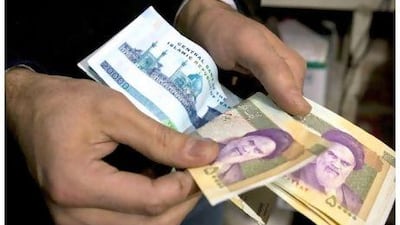Imagine pulling into a petrol station and finding that the cost of filling your tank has quadrupled overnight. At the supermarket, wheat, rice, cooking oil, milk, sugar and other essentials have soared in price. Then you go home and your electricity bill is three times higher. You call for a new bottle of cooking gas - it is five times more expensive.
That was the reality that Iranians woke up to on December 19. The last time petrol prices were raised, in 2007, there were riots. This time, in a re-run of the repression following the re-election of Mahmoud Ahmadinejad as president, Tehran was flooded with police who watched carefully for any signs of unrest.
A reform of Iran's subsidy system was long overdue. Below-market prices for motor fuel, cooking gas, electricity, water and basic food items cost the country a third of its GDP. Subsidies fuelled rampant consumption: Iran is, remarkably, the world's third-largest user of natural gas, after the US and Russia, despite a much smaller population and economy.
It is the largest oil consumer in the Middle East, and a failure to expand its refineries has made it a major importer of petrol. At the same time, Mohammad Reza Farzin, the deputy economy minister, estimated smuggling at 250,000 barrels per day, about a tenth of Iran's total oil exports, mostly to Pakistan. Recent US sanctions have targeted gasoline imports, making the regime acutely aware of a potential Achilles' heel.
And heavy pollution frequently blankets Tehran, blotting out the backdrop of the beautiful, snow-capped Alborz Mountains and recently forcing the city to shut down for several days.
With oil production stagnant or falling, on current trends, Iran could, unthinkably, be a net oil importer within 15 years. By draining the government's coffers, subsidies prevent investment in new production.
And, remarkably for the holder of the world's second-largest natural gas reserves, Iran is a net importer of gas. A large part of that gas is needed for injection into wells to maintain production from its ageing oilfields. By 2020, this demand will absorb Iran's entire gas production, another evident impossibility.
Previous presidents, including Akbar Hashemi Rafsanjani and Mohammad Khatami, had tried but failed to steer similar measures through Iran's factionalised political system. But at a time when the economy is under increasing pressure from sanctions and mismanagement, the pressure to do something finally became irresistible.
An innovative feature of the reform, and one that would be applauded by many economists, is the compensation given to lower-income households. On the basis of countrywide surveys, poorer people are supposed to receive a direct rebate in their bank accounts, amounting to some US$20 (Dh73.46) to $40 per month, covering at least part of the increased living costs.
The government plans to redistribute half of its savings in this way. Another 30 per cent will go to industries to cover higher energy costs; the government will retain the remainder.
Seen like this, the plan is reasonable enough. Indeed, many Middle Eastern states could follow such a road: eliminating their own subsidies on energy, saving valuable oil and gas for export, cutting waste, greenhouse gases and other pollution, while at the same time cushioning the impact on the vulnerable members of society.
But there is a darker side to this ostensibly rational reform.
The sudden withdrawal of subsidies, rather than phasing them out over a longer period, gives people and businesses little time to adjust. Already rampant inflation, driven by an uncontrolled growth of the money supply, can be expected to accelerate.
The poor, and those on fixed incomes such as pensioners and government workers, will be especially hard-hit. These are the very people thought to represent Mr Ahmadinejad's political base. And an inefficient, bureaucratic and corrupt state is unlikely to allocate such payments fairly, even if it has the desire to do so.
It is ironic that a supposedly anti-capitalist president has implemented a plan whose principles would be applauded by the World Bank. But the rebate scheme is clearly intended to strengthen Mr Ahmadinejad's hand.
Already there are reports that 4 million to 5 million people eligible for handouts have not received them - because they are suspected of being involved in "anti-government" activities such as street demonstrations, or simply for not removing opposition slogans from their walls quickly enough. Provinces such as Kurdistan and Sistan-Baluchestan, noted for ethnic unrest, have also suffered delays in payments.
The big industrial groups likely to receive the bulk of compensation are linked either to the state, the Revolutionary Guard or the bonyads, ostensibly charitable trusts run by the clergy.
Having demonstrated its ruthless survival instinct by at least temporarily crushing the opposition Green Movement and jailing many of its leaders, the regime now feels confident enough to make such an unpopular move.
The question is whether such repression can overcome splits in the political elite and continue to quell discontent at inflation, unemployment, falling living standards and the aspirations of Iran's young population. Mr Ahmadinejad's spiritual adviser, the hardline Ayatollah Mesbah Yazdi, opined: "It doesn't matter what the people think. The people are sheep." But such forces were ultimately unstoppable in the Shah's Iran of 1978 and communist Poland in the 1980s.
Robin M Mills is an energy economist based in Dubai, and the author of The Myth of the Oil Crisis and Capturing Carbon


